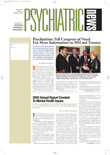APA’s commitment to responding to the traumatic events of September 11 has not waned as people in the United States try to return a sense of normality to their lives in the face of continued security threats. And in the last few weeks substantial anxiety over bioterrorism has, of course, been added to the mix.
While more than 120 print, broadcast, and Internet media contacted APA in the 10 days or so after the attacks asking for information on the immediate and long-term psychiatric consequences and other expertise that APA members possess, in the following weeks staff of APA’s Division of Communications and Marketing fielded more than 80 more, according to Amy Levey, manager of publications in that division.
Among the questions were multiple requests for information on topics such as survivor guilt, revenge fantasies, the impact of increased caseloads on the mental health care system, as well as such questions as, How should these events be explained to children? What kind of person could commit such acts? How do psychiatrists differentiate between acute stress reactions and full-fledged PTSD?
In the week following the anthrax attacks on Capitol Hill and various news outlets, reporters’ inquiries began to reflect an urgent request for information related to the mental health aspects of bioterrorism, Levey said.
Among the questions to APA were ones about strategies that could help reduce the burgeoning anxiety people are feeling, how information might be conveyed to keep the very low risk of being infected with anthrax in perspective in the face of saturation media coverage, and how the anthrax scare might impact health insurance coverage and physicians’ prescription practices.
In addition, APA continues to update the information available on the disaster-related section of its Web site, www.psych.org. The site provides information to psychiatrists, mental health professionals, and the public on treating or responding to the mental health sequelae of disasters. It provides several articles on various aspects of disaster psychiatry and links to the Web sites of other organizations with valuable information on the mental health consequences of terrorism and disasters.
On October 19 APA added information to its Web site on coping with anxiety arising from the growing threat of bioterrorism. Designed to inform the general public rather than professional caregivers, the theme of the APA advice is to “keep the threat in perspective” and an acknowledgment that fear and anxiety in response to bioterrorist attacks are a “normal human reaction.”
Among the points APA makes are that people need to educate themselves about the potential danger, since “facts are frequently less frightening than rumors and myth”; avoid media reports if they significantly increase feelings of anxiety and helplessness; find distractions in hobbies and other activities where you can feel in control; talk about the anxiety with family and friends; minimize caffeine, tobacco, and alcohol intake; and talk to a physician or mental health professional if the fear becomes uncontrollable or interferes with the ability to conduct routine activities.
The APA Web site also provides a link to the Centers for Disease Control and Prevention Web site at www.cdc.gov for information about anthrax and the extent of the threat it may pose to the United States. ▪
